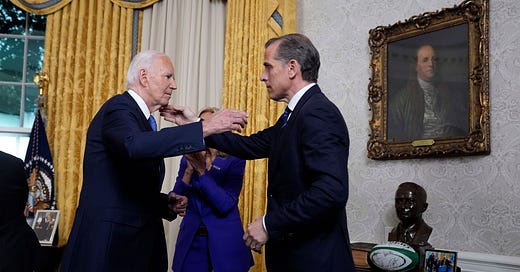
In what might be the greatest subtweet of 2024, outgoing Democratic congressman Dean Phillips spoke for many Americans when he posted on X: “Let’s just say the quiet part out loud, certain Americans are indeed above the law and influence is always for sale.”
Phillips was, of course, responding to the big news on Sunday that President Joe Biden had pardoned his son Hunter—something he had repeatedly vowed he would never do. In the “grant of clemency” Biden issued, he said that Hunter was off the hook “For those offenses against the United States which he has committed or may have committed or taken part in during the period from January 1, 2014 through December 1, 2024.”
Every president hands out pardons at the end of his time in office—but not like this. When Bill Clinton pardoned his half-brother for a 1985 felony drug conviction, Roger Clinton had already served a year in prison. The current president pardoned his son before he was even sentenced.
So the president has not just gifted his son with a get-out-of-jail-free card for Hunter Biden’s embarrassing gun charge. He has not just wiped the slate clean for his tax code violations. The presidential pardon also applies to Hunter’s most egregious offense: his well-documented efforts to peddling access to his dad, when Biden was vice president, to foreign interests ranging from a Chinese state-run bank to a well-heeled Kazakhstan oligarch.
That should outrage anyone who cares about our justice system. But it’s particularly galling that it comes from a president who was running for reelection (until he dropped out in July) on the theme that he was preserving our republic’s democratic norms.
“That’s why a lot of Democrats this morning are assessing our party and its principles,” Phillips told The Free Press. “I still believe Democrats are a party of integrity, but this pardon makes that position complicated at best.”
Phillips is right. The legal protection Biden has handed his son is just the latest example of how the party’s rhetoric about defending the rule of law from Donald Trump was never anything but an empty talking point.
To understand why, it’s important to go back to the very end of the 2020 presidential campaign that Biden won. Three weeks before the election, the New York Post ran a story about Hunter’s laptop, which had been left at a Delaware computer repair shop. The laptop’s contents, which primarily consisted of emails to and from Hunter, were explosive, detailing much of the influence-buying scheme that is now a matter of public record. At the time, however, the FBI briefed social media companies to warn them that the scandalous revelations contained in the laptop were likely Russian disinformation. As a result, Twitter and Facebook prevented their users from sharing the story. The New York Post editorial account was locked out of Twitter for several weeks.
That alone represented a major breach of democratic norms. The FBI is supposed to be nonpartisan. That’s why its regulations stipulate that no major investigative steps against a political figure should be announced in the period before an election. To make matters worse, the bureau had already authenticated the laptop before it briefed the social media companies.
When the Justice Department decided it had to investigate the Hunter Biden affair, the special counsel on the case, David Weiss, treated the president’s son with kid gloves. To start, the IRS investigation into Hunter’s tax evasion was stymied at nearly every turn, according to two IRS whistleblowers who testified before Congress in 2023.
Weiss’s team had negotiated a highly favorable plea deal that would have given Hunter immunity from crimes the Justice Department claimed it was still investigating. This unique arrangement would have kept the president’s son out of jail without requiring him to plead guilty to more serious potential charges of money laundering and being an unregistered foreign agent. It was only because a federal judge in Delaware refused to sign off on a plea deal that it fell apart, causing Hunter to go on trial for lying about his drug use on a gun registration form, and subsequently to plead guilty to tax evasion charges in September.
And this leads to the final piece of corruption in the Hunter Biden matter. For years, the Justice Department declined to pursue criminal indictments of lobbyists who ran afoul of the Foreign Agents Registration Act, or FARA. Between 1967 and 2018, the Justice Department prosecuted violations of that law a mere 13 times. But when former FBI director Robert Mueller began his investigation of the Trump campaign’s alleged cooperation with Russia in the 2016 election, his office threatened FARA prosecutions against lower-level Trump associates to pressure them to cooperate. And after all that, the special counsel never charged Trump or any of his campaign officials with conspiring with Russia.
Yet as The New York Times reported earlier this year, Hunter himself was an unregistered foreign agent back in 2016—when his father was vice president—when he sought help from the State Department to secure an energy deal for Burisma, a Ukrainian company on whose board he sat. Unlike the Trump associates who were threatened with crushing FARA trials, Hunter’s activities drew little interest.
Does Hunter Biden’s influence peddling add up to a scandal? Sure it does—a far bigger scandal than the gun and tax crimes that he was charged with. But the larger scandal is how the resistance to Trump—not just by Democrats but by supposedly nonpartisan agencies like the FBI—created a two-tiered legal system in Washington. The justice system was weaponized against Trump and his allies. For Biden’s son, the justice system was his protection.
Eli Lake is a Free Press columnist. Read his piece “The Tulsi Gabbard Smears Are Unfounded, Unfair, and Unhelpful,” and follow him on X @EliLake.
For thoughtful commentary and investigative reports, subscribe to The Free Press:




